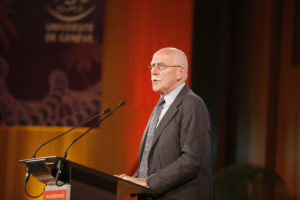Interview with Dick Oosting

©Patrick Gilliéron Lopreno
Meet Dick Oosting, Martin Ennals Foundation Board member, former Deputy Secretary General of Amnesty International and previous CEO of the European Council on Foreign Relations
What motivated you to join the Martin Ennals Foundation?
My motivation was a strong sense of commitment to the legacy of Martin Ennals with whom I worked closely when he was Secretary General of Amnesty (1968 – 1980). He was an inspirational leader and being his deputy during the last years of his tenure was a great experience for me.
When Leah Levin, Martin Ennals Foundation (MEF) co-founder and comrade in arms during those early years, asked me to join the board on her retirement in 2013, it was an obvious thing to do so we could maintain the direct link to the Martin Ennals Award (MEA)’s origins.
By serving on a number of boards of NGOs, I also hoped to make my experience of over 40 years in the human rights field, including in managing and governance roles, available to the next generations.
What do you think the next generation has going for it, and what do you hope they take away from your experience?
It seems to me that they have a more realistic understanding of the big challenges that the world is facing. It may be wishful thinking but I see a growing sense of the need to do something among the youngest generation that now faces the consequences of climate change and pandemic. With today’s vastly increased means of mobilization, there is a potential to take that to new levels.
Elements & experience Dick is sharing with us about his own human rights journey:
It is exciting to see the human rights movement evolve from the formative years of the 70s/80s as a predominantly western endeavour, to today’s global and transnational human rights movement with a steadily growing recognition of the need to empower those on the frontline of the struggle: Human Rights Defenders (HRDs). In different roles in Amnesty over a long period, I had a unique vantage point on this evolution. Through Martin Ennals Foundation, we can protect and support HRDs so they can continue their struggles on the ground.
I witnessed the advance of economic and social and rights to attain essentially equal standing in the human rights struggle. It has allowed for a more realistic approach in which ‘human rights’ is no longer just a question of absolute principles but can be shown to embody values that are highly relevant to economic or national security interests. The profiles of MEA finalists and laureates over the years reflect this important shift towards a much more comprehensive view of human rights and what it takes to defend them.
I had the chance to manage a Dutch child protection agency and the Dutch refugee council between my years in Amnesty International. These experiences showed me different ways in which the state’s responsibility for the human rights of its citizens plays out: the rights of children to be protected from harm within the family; the importance of seeing refugees as strong survivors who can contribute greatly to our societies if given the opportunity, and respect. Bringing the lofty principles of human rights down to the individual level is where these challenges and opportunities are met, and the MEA highlights precisely that, through its focus on those individuals.

